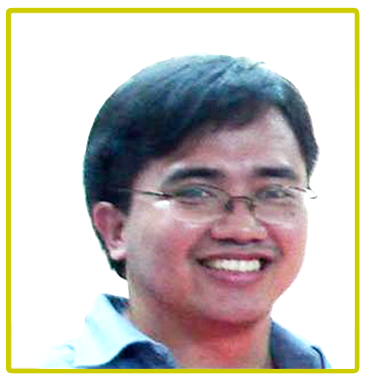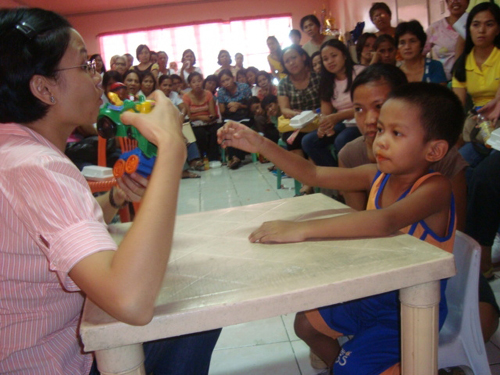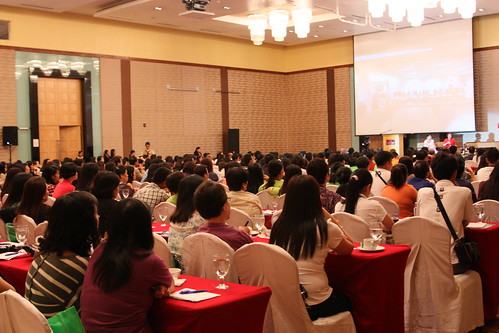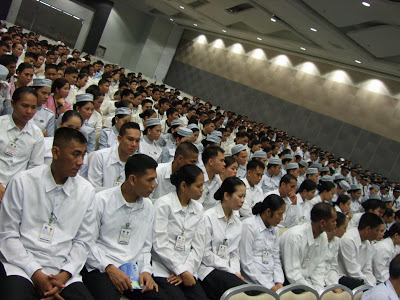1. I SEE A NUMBER OF CONFERENCE RATES ON YOUR REGISTRATION PAGE. WHICH IS THE BEST DEAL FOR INTERESTED REGISTRANTS LIKE ME?
Get the early bird 4-day package for ASP members!
a. You get to attend the 2-day conference and the 2-day post-conference workshops.
b. You get savings of P3,000! It is only P5,000 compared to on-site registration fee of non-ASP members at P8,000. For updated ASP members, this package saves you P2,000 versus on-site registration!
Click here to go to the registration page
2. CAN I REGISTER NOW AS ASP MEMBER TO AVAIL OF THE MEMBERS' DISCOUNT HOW?
Yes!
You can register anytime as member.
click here for registration form. To ensure smooth on-site registration, application for membership on October 24, 2009, from morning until 12 noon, will not be entertained. So, hurry!! Register as member before September 30 to catch the best early bird 4-day package!
3. I AM AN ASP MEMBER BUT HAVE NOT PAID MY ANNUAL DUES. CAN I STILL AVAIL OF THE MEMBERS’ PACKAGE?
ASP members’ discount privileges apply to “updated” members only.
Click here to registration form.
4. I CANNOT ATTEND ALL 4 DAYS. CAN I CHOOSE AMONG THE 4 DAYS?
You can choose from any of the following:
a. 2-day conference Oct 24-25
Click here for Conference Schedule
b. Oct 26 post-conference workshop
Click here for Oct 26 Post Conf Sked
c. Oct 27 post-conference workshop
Click here for Oct 27 Post Conf Sked
d. Any combination of a, b, and c.
5. CAN I PAY FOR THE 4-DAY PACKAGE, BUT SHARE IT WITH SOMEONE ELSE?
Yes. You can pay for 4-day package, and have different persons to attend each day.
However, Only ONE (1) ID, 1 set of meal stubs, 1 certificate, 1 conference kit will be issued, and only to the REGISTRANT’s NAME.
6. HOW MANY CERTIFICATES WILL BE ISSUED TO EACH PARTICIPANT?
a. 2-day Conference – one certificate
b. Post-conference Workshop 1 – one certificate
c. Post-conference Workshop 2 – one certificate
Those who register for the 4-day package will get a total of 3 certificates.
7. I REALLY WOULD LIKE TO ATTEND THE ABB CONFERENCE, BUT MY BUDGET IS LIMITED. HOW CAN I MAKE IT LIGHTER ON MY POCKET?
a. Avail of group rates. Please call 926-6941 or 929-8447 for the mechanics.
b. Look for friends/relatives/sponsors who are willing to sponsor your registration fees or place a full-page ad in the conference souvenir programme, which includes one free 4-day package.
8. I WANT TO REGISTER NOW. HOW?
Download registration form from
www.autismbeyondborders.com
Please note that discounts will only be locked after complete payment has been made. If you miss the Early Bird deadline, you are still eligible for the Advanced Reg date. After September 15, there will no longer be any discounts.
If you choose to fill in the downloadable form, please fax the accomplished form to 7-903-5496 along with the deposit slip as proof of payment
An email confirmation will be sent to your registered email address. Please present this email confirmation at the Registration Desk at the conference venue.
Online registrants may opt to pay thru Bank Deposit, Wire Transfer or Paypal. Registrants who choose Paypal, will be sent a PayPal email invoice. Online registrants will be officially confirmed only after payment.
For bank deposits, please deposit your registration fees to: BDO-Kamias Branch SA #3980002955 *Please ask for your Official Receipt.
9. WHAT IF I HAD ALREADY REGISTERED AND PAID BUT COULDN'T ATTEND FOR SOME UNFORESEEN REASON? DO I GET MY MONEY BACK?
All paid registrations are final and cannot be cancelled. If for some reason, you cannot attend the conference, you may transfer the registration to another person. Please email the Conference Registrar for further details.
10. DO YOU HAVE A PARTNER HOTEL WHERE I CAN STAY DURING THE CONFERENCE?
The Legends Hotels International is ASP’s partner for the conference. You can choose among the following hotel affiliates:
a. Legend Villas Mandaluyong
Click here
b. Mabuhay Manor Pasay
Click here
c. Kabayan Hotels provide discounted rates for ASP delegates
Click here for accommodation rates.
Kabayan Pasay,
Kabayan Cubao,
Kabayan Caloocan
If you have other questions, please email them to autismphils@gmail.com or autismphil@pldtdsl.net.
APPLYING FOR ASP MEMBERSHIP IS EASY!
1. Download ASP membership form from www.autismbeyondborders.com or email autismphils@gmail.com
2. Email accomplished membership form to autismphils@gmail.com or fax to 7-903-5496.
3. Annual membership fees:
a. Php 400.00 – for family members
b. Php 500.00 – for professionals
c. Php 1,000.00 – for institutions
Deposit to Autism Society Philippines Savings Account No. 3980002955
(Banco de Oro Kamias- Anonas Branch)
Or
Pay at to Autism Society Philippines National Office at Room 307 ML Building, 47 Kamias Road, Quezon City.
An Official Receipt will be issued upon receipt of payment. For bank deposits, you may claim your OR at the office. (Be sure to bring your validated deposit slip).
What are the benefits of being an ASP Member?
o Discounts for ASP’s monthly seminars and conferences
o FREE ASaP e-newsletter regularly directly to your inbox
o Subscription to ACAP newsletter twice a year
o SMS monthly updates via I-Blast
o Most importantly, your membership is your contribution to improving the lives of persons with autism and their families
REGISTER NOW for the Autism Beyond Borders Conference
and enjoy EARLY BIRD DISCOUNTS until Sept. 30!






 Posted in: 4parents
Posted in: 4parents



















 Filipinos are known to be religious. Valuing traditions handed down from the older generations, families usually congregate together on Saturday or Sunday mornings to go to church and hear Mass together. In order to prepare the children, they underwent catechism for two consecutive Saturdays. Together, they watched a video of an actual Catholic Mass, taught how to make the sign of the cross, and to pray the Our Father, and taught them on how to receive the Holy Communion.
Filipinos are known to be religious. Valuing traditions handed down from the older generations, families usually congregate together on Saturday or Sunday mornings to go to church and hear Mass together. In order to prepare the children, they underwent catechism for two consecutive Saturdays. Together, they watched a video of an actual Catholic Mass, taught how to make the sign of the cross, and to pray the Our Father, and taught them on how to receive the Holy Communion.




